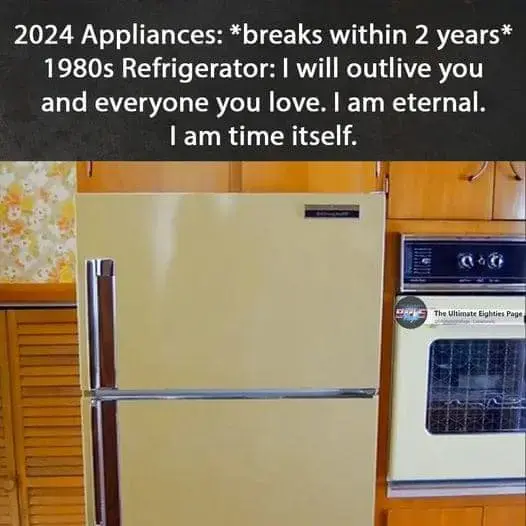this post was submitted on 19 Oct 2024
176 points (100.0% liked)
Jokes and Humor
6206 readers
38 users here now
A broad community for text and image based jokes, humor, and memes.
This community's icon was made by Aaron Schneider, under the CC-BY-NC-SA 4.0 license.
founded 1 year ago
MODERATORS
you are viewing a single comment's thread
view the rest of the comments
view the rest of the comments

So, I learned something interesting about the technology underpinning refrigerators once. In my case, it was an old HVAC AC unit.
We had it checked once, and the tech said the until was really old, but seemed fine. It turns out the old units lasted forever, because they were made with heavy duty materials - thick steel, etc. The downside was that the efficiencies were really low. He said it was a trade-off: you get higher efficiencies by using thinner metal with better thermal conductivity, but you sacrifice durability. Basically, it's a trade-off between durability and efficiency. Whatever built-in obsolescence you get is on top of an essential limitation in physics: it takes more energy to transfer heat between thick metal and thin, and thin just doesn't last as long.
I'm not a materials scientist, so I'm probably paraphrasing him wrong and misinterpreting it, but since his advice was to not replace it until it died, which could be another decade, unless I had an urgent desire to get a higher efficiency unit, I figured he wasn't BSing me and took him at his word.
I absolutely believe in planned obsolescence, but I also believe that there are some fundamental laws of physics contributing to lifespan of appliances. If you want high efficiency (in some types of appliances, such as refrigerators), you're generally going to be working with more flimsy materials which are more prone to breaking down.
I suspect that the higher efficiency don't make up for the irreparability and subsequent waste of replacing appliances more often, but Energy Star contributed to requiring some of that, so not all of the blame can be laid on manufacturers.
In the case of refrigerators, there doesn't need to be any trade-off between efficiency and heavy duty. The main thing determining efficiency is primarily where the heat exchanger is positioned (top mounted is the most efficient, but uncommon), and the thickness and quality (R value) of the insulation.
If you add extra insulation to an old heavy duty fridge, it increases its efficiency by 50% or more (depending on the thickness of insulation).
The extra insulation, as a side effect of better efficiency through better temperature retention, will also extend the lifespan of the compressor, which will need to run half as much as normal.
The main reason this isn't done from the factory is cost, and to reduce the physical dimensions of the fridge.